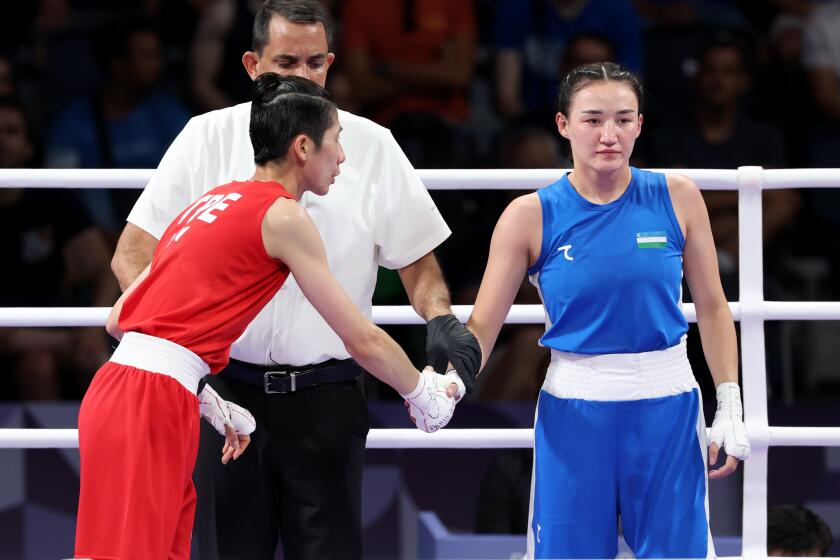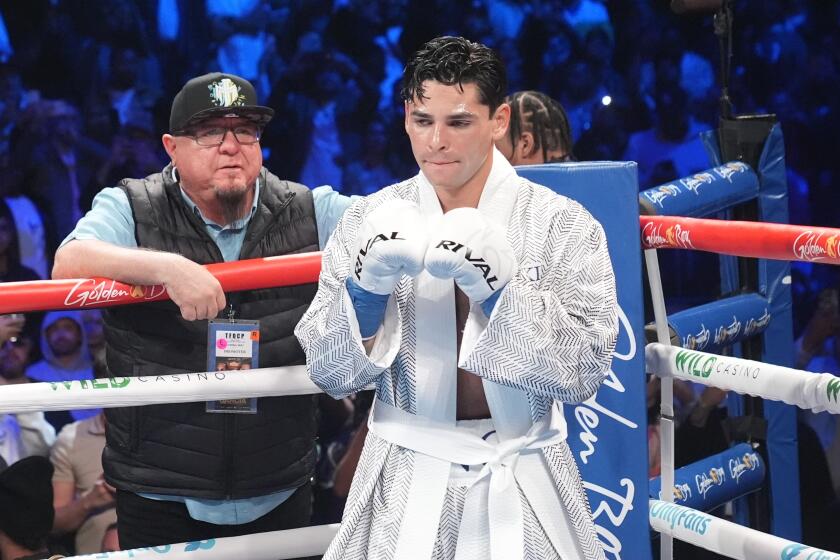Love packs a punch
AT a gym tucked away on a grungy block above Sunset Boulevard, 18 heavy punching bags swing slowly from a rack of steel girders, like carcasses on butcher hooks.
A barefoot man with a soft face begins to stalk one of the bags, breaking the silence with two jabs and a thunderous kick. Soon, he is joined by a lanky woman with black, spiky hair and her mother’s name, Rhea, tattooed in Gothic script on her left wrist.
They turn on each other, striking with fists, feet, knees and elbows. Her breath quickens. “Suck it up,” he tells her. She kicks him, hard, on his neck. “That’s better,” he says. Then she leans in and gives him a tender kiss.
Here, in the bosom of one of America’s most violent sports, love is blossoming.
Toby “Tiger Heart” Grear, 27, and “Roxy Balboa” Richardson, 29, are part of a growing wave of people who are once again stepping off the apocryphal bus in Hollywood to find their fame. Unlike their predecessors, they are not here to act, or to dance, or to sing. They are here to fight.
The sport of mixed martial arts -- known to many of its fans as ultimate fighting -- has leapt into the central tide of American pop culture. With its ascendance has come a network of fight clubs and training centers, many of them in Southern California.
One new entry can be found under a parking garage adorned with a peeling portrait of Marilyn Monroe. Legends Mixed Martial Arts Training Center, which opened in August, is billed as a “university” where aspiring fighters can learn all of the necessary crafts under one roof -- the footwork of boxing, the “science of eight limbs” (two feet, two knees, two elbows, two fists) of Thai-style kickboxing, the submission tactics of Brazilian jujitsu.
Many of the gym’s 300 members -- accountants and actors, even a golfer looking for more distance off the tee -- are among the legions in Los Angeles who are looking merely for a workout. But 50 of them, give or take, are looking for more.
They have come from Ohio, from Tennessee, from Sweden, and they are here to learn from professionals and, in a sense, to get discovered -- to attract the attention of managers and trainers who can land them real fights.
Theirs is a new, Spartan existence, draped on the fringes of an emerging sport and far removed from the glitz of the sport’s upper echelon. It is embodied by Toby and Roxy: an inseparable couple, college-educated, articulate and ripped with muscles.
Five blocks from their small apartment, they help manage the gym and train its members. Inside, they swap tips: Keep your pivot ankle at a 90-degree angle to gain more velocity on a kick; use nasal spray to constrict the passages of the nose, thereby preventing nosebleeds if you get hit in the face. They trade gym shorts, except for the lucky pair that Toby hasn’t washed in two years. They nurture each other: Roxy gives him books on nutrition to wean him from fast food; he gives her books by the self-help writer Dale Carnegie.
And they train together, whaling on each other to prepare for their next fight, hoping to escape the minor leagues of their sport -- “waiting,” Toby said one recent afternoon, “for someone to find us.”
His Midwestern roots
He is from Lima, Ohio, a Rust Belt town named for the city in Peru -- because Peru sent over the medicine used to treat malaria during the pioneer days -- but pronounced like the bean.
He was the second of three boys, all red-headed, all built like sycamore trees. In Lima, a boy who doesn’t play sports in his spare time has to get a job, so, naturally, the brothers became fanatical athletes. At his Catholic high school, Toby ran track, competed on the swim team and, his senior year, was captain of the football team, which held Mass before every game, with players in full pads and uniform.
In the winter of 2000, midway through the University of Dayton, he yearned for a new sport. He flipped through the yellow pages, landing in the M’s -- in “Martial Arts.”
He enrolled in a small martial arts academy in northwest Ohio. It was a clarifying event, so much so that he remembers the color of the shorts his first mentor was wearing the day they met: blue. By the end of the year, his trainers put him in his first tournament. It was at a local union hall, a “roughman tournament.”
“I was 150 pounds. Skinny, skinny, skinny,” Toby, now all the way up to 160, said one recent morning. “I fought a guy who ate steroids for breakfast.”
In the second round, Toby faked two jabs and then spun in a circle, catching his opponent on the side of the head with the back of his fist.
“I put him on his ass,” Toby said. “I started whaling on him. He didn’t come out for the third round.”
Amateur fights soon gave way to small purses and, last year, he turned pro in mixed martial arts.
“I had told everybody I could never do it, that it was too brutal,” Toby said. “Then I tried it. And everything changed. It was so open. You could do anything. I could see the future.”
He was hooked. And he was good. Most important, perhaps -- in a thoroughly modern sport where image is key and promoters expect their talent to entertain -- he frequently won in spectacular fashion.
At one fight, Toby instinctively leapt over his opponent’s leg kick and then pounded him into submission so quickly that he had to yell to the referee to point out that his opponent had lost consciousness. At another, with his opponent on top of him, Toby scored a technical knockout while on his back, traditionally a vulnerable position.
“I understand that it’s a performance,” he said. “I consider myself a full-contact actor.”
Her vagabond beginnings
She was raised by a single mother, a woman she describes as the black sheep of an upper-crust British family. In stark contrast to his archetypal Midwestern childhood, hers was one of itinerant privilege.
Her mother, traveling in the United States, met the man who would become her father at a bus stop in Arizona. Roxy has never met him. “I was a mistake,” she said.
She and her mother were “gypsies” who wound up living, under circumstances she still doesn’t quite understand, in Italy, California, Maryland, Colorado. It was an exotic life, one she roundly rejected when it came time for high school. She announced that she would no longer be moving, and she boarded at a small Quaker school in Maryland, then attended LaSalle University in Philadelphia.
After college, she “bummed around,” she said, promoting late-night “rave” parties, bartending, driving a delivery truck for a restaurant. She moved to Los Angeles in 2002 and soon walked through the doors of a kickboxing academy.
Before long, she fought her first “smoker,” a small fight often held after hours at martial arts academies. Roxy looks tough; she often wears a pair of brass knuckles on a necklace. But when she stepped into the ring that night, she said, “I thought: ‘What the hell am I doing here? This is really scary, and I want to get out.’ ”
She held her own; the kickboxing fight ended in a draw. A few months later, she recorded her first knockout.
“There is nothing like it,” she said. “It’s exhilarating. It’s not the brutality that gets you. It’s finding your strength, realizing that you did this even though the other person was trying to do it to you.”
Two hearts converge
They met through e-mail last year, introduced by a mutual friend. In April, Toby told her he was coming in from Ohio for a fight. He asked if she could pick him up at the airport.
“It was very romantic,” she said with a chuckle. “I never thought I would meet my boyfriend at LAX.”
If he was to make a real run at a career in mixed martial arts, they decided, he needed to move to the West Coast. He moved to L.A. in June. They moved in together the next month.
“I never thought I would find someone I could love so much,” he said, “and someone I could spar with too.”
As for Roxy, “I needed to find a man who is tougher than me,” she said. “And I did.”
Their training sessions can be harsh and aggressive. One recent afternoon, Toby was overseeing sparring sessions when he admonished a fighter who was pulling his punches against Roxy.
“Don’t give her any breaks!” he yelled. “Don’t be a sissy!”
Some days, it’s a bit much for Roxy, who was so meek in high school that her basketball coach ordered her to foul more often.
“I forget that he is a natural fighter,” she said, still nurturing a large, yellowing bruise on her shoulder, the remnant of one of Toby’s kicks. “I wouldn’t call myself a natural fighter. But this is in his blood. I don’t particularly like sparring with him. His whole persona changes. It’s like fighting with someone that I don’t really want to know.”
He seems unfazed.
“She loves it,” he said with a grin. “You know she does.”
Roxy also harbors fears that he could wind up with lasting injuries.
“It’s sad when I talk to fighters who have been around and have pretty clearly taken one too many hits,” she said. “He’s got this insane energy to him, and it’s never pleasant to think that he could wind up like that. But it would be more devastating to him as a person to not do it. You can’t live that way.”
And so they move on, fight by fight.
For now, Roxy is an amateur kickboxer, and conflicted about her future.
She has considered making the leap to mixed martial arts, though the opportunities for women are still few in the sport. She is also considering turning pro as a kickboxer. Then again, after losing a December fight, she is also thinking about retirement. Toby has encouraged her to think about it, saying it anguished him to watch her suffer. She said she’s loath to even contemplate the idea, if only because she can’t bear to go out with a loss.
Someday, they would like to move to Ohio to open a training center of their own. Their plan will work, they figure, only if they can sell themselves as successful fighters. In a sport that is only now emerging in the limelight, there are still perhaps fewer than 50 fighters in the country who are making a decent living fighting full time as mixed martial artists.
So Toby is giving himself five years, he said, “to become a legend.” First, though, he has to wind his way though the lower-tier pro organizations that are granting him fights. He must win, more often than not, and he must win with style.
Appointment in a cage
It is fight night, a balmy evening in October.
Toby is scheduled to fight in one of the top bouts of the evening at a California Xtreme Fighting event at the Upland Indoor Sports Arena. CXF is one of the many upstart organizations looking to profit from the upsurge of interest in mixed martial arts; on this night seven of the 20 fighters on the card will be making their professional debuts.
Toby will be paid $1,000, win or lose. His opponent: Victor “Joe Boxer” Valenzuela, a menacing-looking man with a goatee and tattoos. Valenzuela knocked out one recent opponent in 12 seconds. Then again, Toby has never been knocked down, much less knocked out.
At Legends, Toby’s entourage is assembling -- trainer Chris Reilly, a former pro kickboxer and one of the gym’s owners; two other fighters who will work his corner; and his mother and grandmother, who have flown in from Ohio. Toby had disappeared for the afternoon, telling everyone to leave him alone. Soon, he walks in, quieter than usual and more intense.
“Hey, champ,” Reilly tells him.
In a rented minivan, Toby swings by his apartment to make sure he has a knee brace. “Who hurt their knee?” his grandmother, 67-year-old Barb Neinberg, asks from the back seat. “Nobody,” Toby said. “It’s a big ploy to make him think I hurt my knee.”
The mind games are underway. Promoters love a grudge among their fighters and, earlier, Toby had handed them one on a platter.
He had been scheduled to fight Valenzuela a few months ago, but Valenzuela had pulled out, citing a hand injury.
One day, Toby joked with friends that Valenzuela had injured his hand by entering “Toby Grear” into an Internet search engine and pulling up videos of Toby’s ferocious knockouts.
Valenzuela’s manager, however, was within earshot. He passed word of the insult on to his fighter, who was not pleased.
When he walks into the arena, Toby spots Valenzuela.
“There he is,” he says. “Still mad at the world.”
The crowd, some of whom have paid $100 for cage-side seats, is filing in. Sponsors -- mostly energy drink and athletic wear companies -- have hired young women to mill about the crowd wearing thongs and tight camouflage T-shirts.
Referee Cecil Peoples summons the fighters for a review of the rules, a speech that could be viewed as performance art in a different setting.
“No head butting,” he tells them as they nod in solemn agreement. “No biting. No fish-hooking. No groin attacks of any kind -- biting it, scratching it, twisting it. No fingers in any orifice. You can tear up the tush. Just stay away from the kidneys.”
Toby is in the seventh fight on the card. Soon, organizers summon him and his team into a small room leading to curtains where fighters will enter to their chosen song, surrounded by fake smoke and strobe lights. Toby has picked a song called “Circumstances” by the Jamaican dance hall artist Buju Banton:
Circumstances made me what I am.
Was I born a violent man?
Toby pulls down his hood and closes his eyes. The announcer’s voice booms over the loudspeakers: “Originally from Lima, Ohio, I give you ... Toby ‘Tiger Heart’ Greeeeeeear!”
Reilly, his trainer, leans in close: “Put the bad guy to sleep,” he says.
The crowd is going nuts. When the fight begins, Toby reaches out to tap gloves with Valenzuela. It is a common gesture of respect in combat sports, but Valenzuela refuses to do it. Toby looks startled.
He tries a flying kick, which he cannot land. Valenzuela pounces on him, pinning him against the cage wall.
They begin trading punches -- the only style of fighting that Toby’s trainers cautioned him against, because Valenzuela has an extensive background as a boxer. Valenzuela lands a vicious body blow that seems to sap Toby’s strength.
“Put him away!” one of Valenzuela’s trainers shouts.
And then he does. After a relentless flurry of punches, Toby begins to stagger, then stops defending himself at all. At 2:46 of the first round, one last punch crumples him.
The fight is over. He has been knocked out. Doctors rush into the cage as blood trickles ever so slightly from his temple.
Tears well in the eyes of Toby’s mother, Teresa Grear, 51. There are days, she confesses, when she wishes he would just come home. He had worked for the family business, a building supply company, and showed a real talent for it, she said.
“He’s smart,” she says, gazing toward the cage. “He went to a private college. But this is the path he has chosen, and it’s his path, not mine. I have to remember that. Even when the blood runs out of my body watching this.”
Toby walks backstage to gather his gear. Roxy gives him a lasting hug and wipes the sweat from his brow.
“My girlfriend is still cuter than his girlfriend,” Toby says.
“You were close,” Reilly tells him. “The guy was hurt.”
“It was bad,” Toby says. “Real bad.”
“You know what, man?” Reilly tells him. “Once in a while, everybody has a bad day at the office.”
More to Read
Go beyond the scoreboard
Get the latest on L.A.'s teams in the daily Sports Report newsletter.
You may occasionally receive promotional content from the Los Angeles Times.











